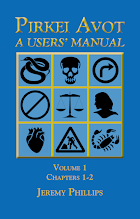This is my new book, Pirkei Avot: A Users' Manual. Published by Targum, its three volumes span some 1,600 pages of in-depth discussion and analysis of every mishnah and baraita in the Ethics of the Fathers, together with extensive references that span over 3,000 years of both divine and human thought. A clue to the function of this book can be found in its title. Mishnaic ethics aren't just there to be studied and revered: they are there for us to apply in our everyday lives. Pirkei Avot: A Users' Manual seeks to help the reader do just that -- to internalize its teachings and put them into practice on a daily basis.
You may be wondering why I have written this book. Aren't there plenty of commentaries and discussions of Pirkei Avot already? Maybe there are too many of them? Perhaps this is true, but every generation needs its own commentaries because we forever find ourselves facing challenges that were unknown to previous generations -- and our children will face challenges unknown to us. This book discusses issues involving the internet, smartphones and the social media, Covid, peer pressure and the demands made on domestic budgets by everyday life in modern society.

Each teaching is given in Hebrew and English, sometimes with more than one translation. It is introduced and then analysed, then closes with a list of topics for open discussion or private contemplation. There are also many tables, to enable the reader to cross-refer teachings that relate to one another and also to show the true nature of what Avot does -- and does not -- contain.
You may be asking what credentials I have for writing this book. Ideally it should have been written by a respected rabbi with a background in Torah learning. I am not that person -- but I have been studying Pirkei Avot since 1988 and have worked hard to establish it as my moral compass in life. I've not always succeeded, but my experiences have taught me a great deal about Jewish ethics -- maybe more than I might have learned from solely reading books.At the moment this book is only available from my local bookshop in Jerusalem, Pomeranz Books. Once copies have been distributed further afield, I'll let everyone know.
The images on the three covers all relate to teachings that can be found in the relevant volume. Enjoy the task of working out what image alludes to.




